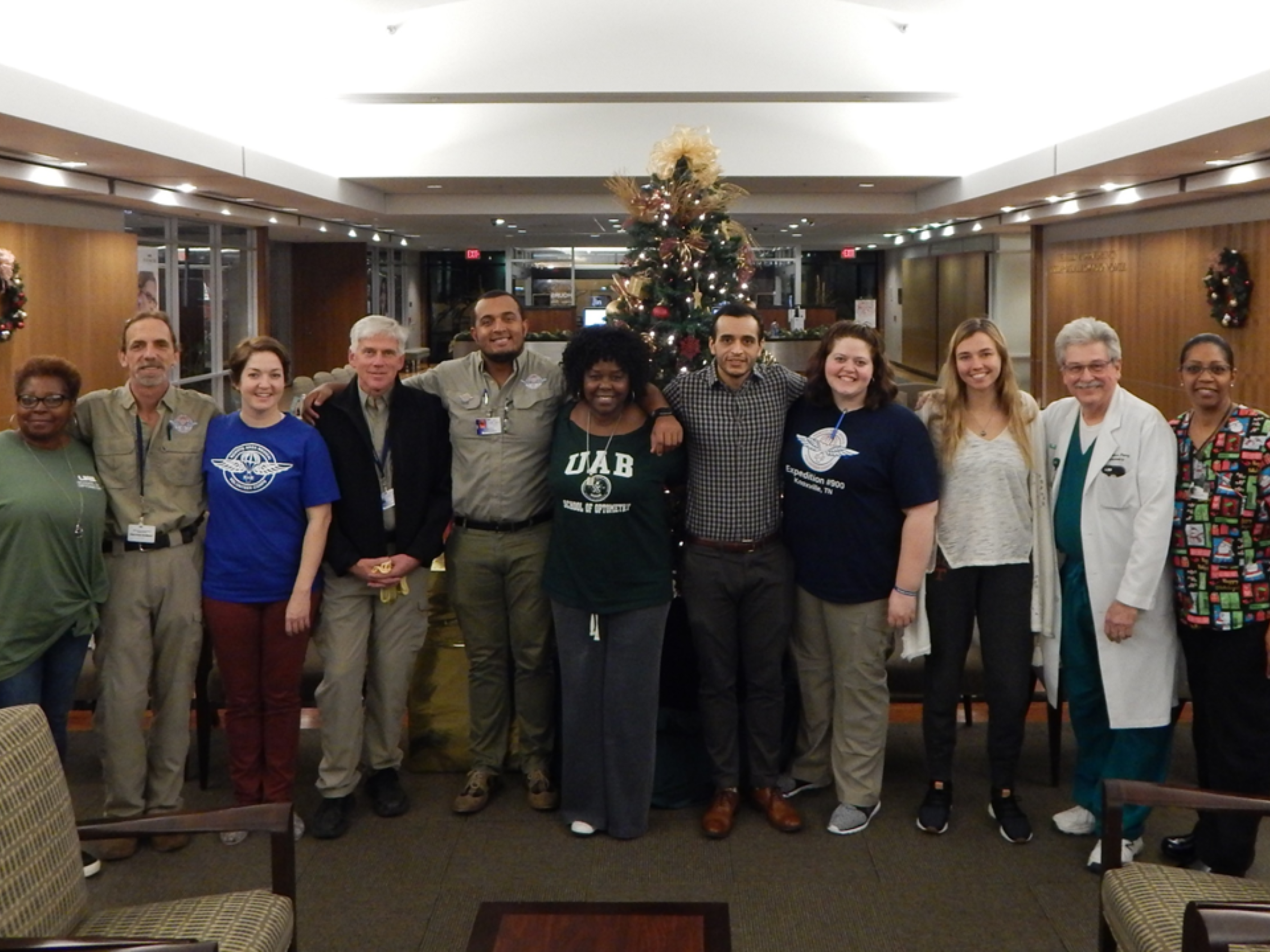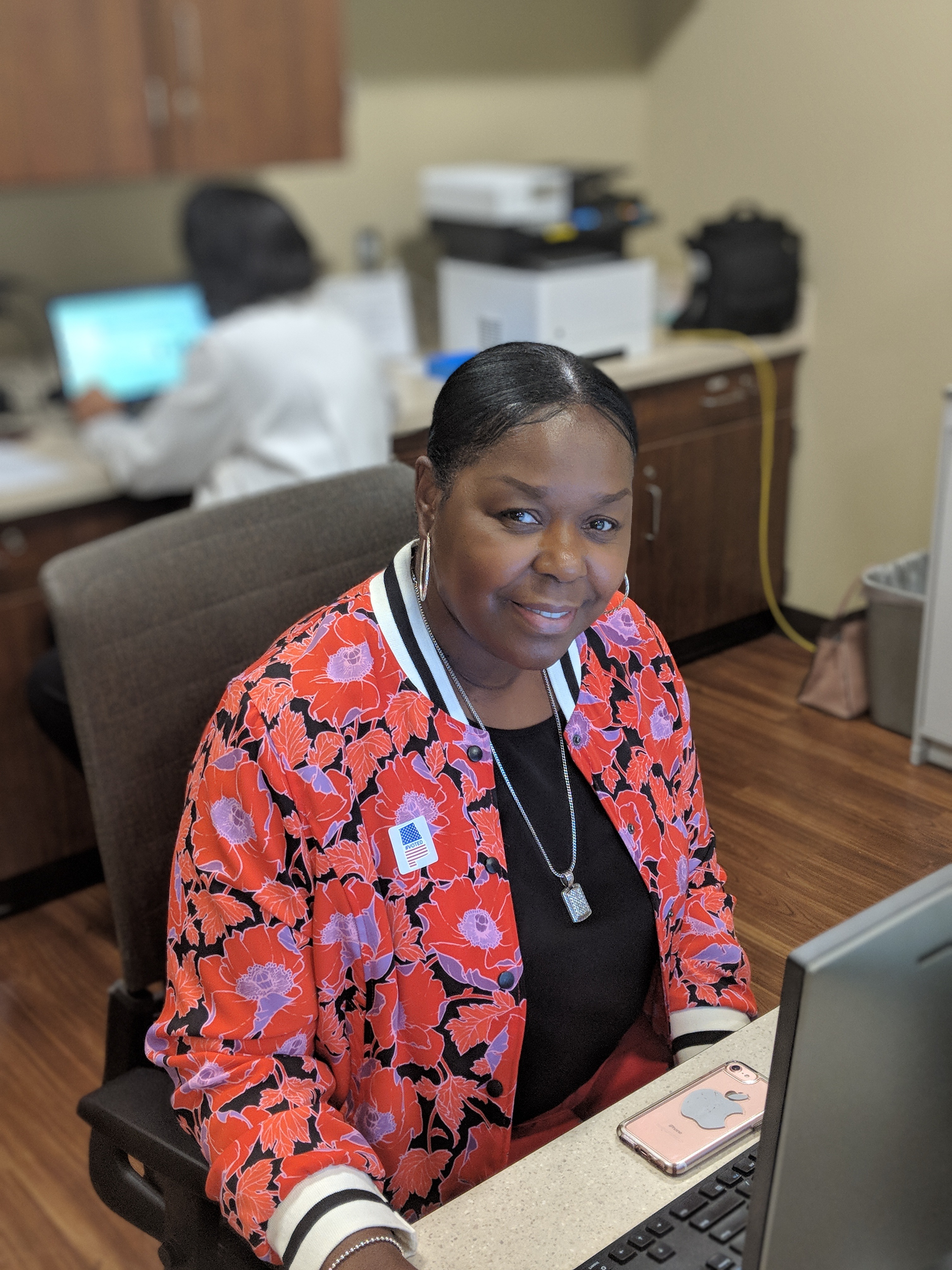Community Eye Care (CEC) is celebrating its 50th anniversary of vision screenings and comprehensive eyecare to communities. This year, the UAB School of Optometry (UABSO) is recognizing those who have helped CEC provide vision services to underserved and underrepresented communities as faculty, staff or as a student. With this in mind, meet former staff member Scelelar (BB) Jefferson.
Jefferson started her career at UAB by working for two years at the UAB Ziegler Dental Clinic. After a 20-year hiatus from the university, she returned to UAB and began working at UAB Eye Care, UABSO’s clinical arm. Her struggles as a single mother of five children are why she appreciated the needs of underserved patients.
Although she retired in 2020, Jefferson continues to work with CEC’s Gift of Sight event each year to help underserved communities.
Describe your past or present involvement with CEC.
I’ve always been a people person, so working with CEC was a job sent from heaven. On April 27, 2011, Alabama experienced one of the largest and deadliest EF5 tornado outbreaks ever recorded. Sixty-two tornadoes struck Alabama, and hundreds of lives were lost.
Those who survived lost everything, including their medication and glasses. Vision Service Plan Insurance (VSP) partnered with the School of Optometry to provide free vision care and glasses to those victims in need. I was asked to coordinate this mission.
This relief mission lasted the entire month of May. It was daunting because we had to set up clinics in the hardest-hit areas, which required us to move locations every two or three days. I coordinated interns and doctors from the School, as well as private practice optometrists who heard about our efforts and wanted to help. We helped to provide care to over a thousand tornado victims.
Although I am retired, I continue to work with the CEC each year through their Gift of Sight program. Which just so happens to be a spinoff of the tornado relief mission. Our partnership with VSP went so well during the tornado relief that they told me to give them a call if I ever needed them, and I did. They did not hesitate to help with CEC’s Gift of Sight project. The holiday program is funded by donations, which allows other organizations and individual donors the opportunity to give back to underserved communities during this time.
Why are you passionate about serving underserved communities?
I believe my passion to help underserved communities comes from my personal experience. I have eight siblings, and I am number six. We lived in government housing until I entered the eighth grade, and my mother was a single parent who escaped an abusive marriage. Later in life, I also became a single mother of five after the end of a twenty-three-year marriage.
The struggle I experienced was real, and it still is for many. Coming to work for the UAB School of Optometry helped to change my life and my living situation. So, when CEC Clinic doors opened and our patients entered, I would always see my younger self in them.
How do you believe CEC has impacted underserved communities?
So many lives have change d through the work of CEC. When lives change for the better, then communities change for the better. With the help of VSP vouchers, we provide free quality vision healthcare and free glasses for those who cannot afford them.
d through the work of CEC. When lives change for the better, then communities change for the better. With the help of VSP vouchers, we provide free quality vision healthcare and free glasses for those who cannot afford them.
I witnessed multiple diabetics, who had gone years with blurry vision because of their financial difficulties, receive eyecare that allowed them to see clearly. I saw numerous glaucoma patients at risk of blindness receive the medication they needed. I even witnessed those who were able to finally get their driver's licenses because CEC provided them with the prescription glasses they needed. CEC has impacted communities by providing a better quality of life for underserved communities.
What is your most memorable CEC experience? Why?
My most memorable experience would be from one of the Black Belt Clinics. As we were preparing to pack the equipment on vans to return to the School, one of the patients asked me not to leave until she returned. Most Black Belt patients walk or catch a ride to our clinics because most can’t afford their own cars.
The patient returned with a box, and inside that box were a dozen fresh eggs from her chicken coop, some green beans, tomatoes and corn from her garden. She couldn’t pay us with money, but she wanted to show her gratitude for what CEC had done for her and those in the community.
Why is this so memorable? Because it reminds me of a scripture in the Bible that says, 'For I was hungry and you gave me food to eat, I was thirsty and you gave me something to drink, I was a stranger and you invited me in. I needed clothes and you clothed me, I was sick and you looked after me. I was in prison and you visited me.' CEC helps those in need!
How has working with CEC impacted your life?
I think working with CEC helped soften my heart towards others. Growing up in the hood, you become tough skinned. Like a farmer tills the ground to get rid of weed roots and soften the soil, so did CEC help to break down the hard surface of my heart. I’ve always used this analogy when describing the School of Optometry:
- The classrooms represent the brain of the body, this is where the interns gain knowledge.
- The clinicals represent the hands and feet of the body, this is where the interns work on sharpening their skills from the knowledge they have gained.
- CEC represents the heart of the body, this is where the interns learn to add compassion to the knowledge and the skills they have learned.
